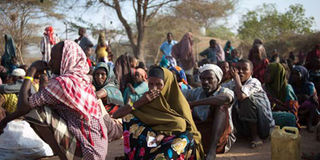UN says only 13,000 refugees have left Dadaab in 18 months

Newly arrived Somali refugees sit outside a transport centre in Dagahaley Refugee Camp near Dadaab in Kenya on July 22, 2011. Kenya's Dadaab camp was built for 90,000 people but it is now home to nearly 440,000, including 59,000 who are living on the outskirts of the camp. PHOTO | AFP
What you need to know:
The targets were set in the context of a 2013 agreement signed by the governments of Kenya and Somalia and the UN High Commissioner for Refugees.
Returns to Somalia have recently been slowed by rains, which have destroyed roads.
The UN has had to rely on airlifts to take the refugees back to their country.
A single flight costs $25,000, UNHCR spokesman Andrew Needham told the Nation in an email.
NEW YORK, Wednesday
A total of 13,440 Dadaab camp refugees have voluntarily returned to Somalia in the last 18 months, a UN official has said.
That means it is unlikely that the UN would achieve the 2016 target of 50,000 and 65,000 in 2017.
The targets were set in the context of a 2013 agreement signed by the governments of Kenya and Somalia and the UN High Commissioner for Refugees.
Returns to Somalia have recently been slowed by rains, which have destroyed roads.
The UN has had to rely on airlifts to take the refugees back to their country.
A single flight costs $25,000, UNHCR spokesman Andrew Needham told the Nation in an email.
More than 340,000 refugees — a majority from Somalia — were at the Dadaab complex by the end of last month, UNHCR reported.
Nearly 190,000 — more than half of them from South Sudan — were at Kakuma camps in Turkana County as of mid-March.
The Kenyan Government announced early this month that it intended to close the Dadaab complex and asked its residents to go back to Somalia.
“If the refugees are forced to return, this will be a breach of international law. The UNHCR will not facilitate such a move,” Mr Needham said.
“Returning refugees by force will have severe humanitarian and practical consequences.”
UNHCR gives every returnee $100. The maximum a household can get is $600. They also receive three months of food assistance upon return.
The UN agency has previously warned that threats of attacks by Al-Shabaab militants and a lack of basic services in Somalia worked against large-scale return of refugees.
It added on Tuesday that it had little information about the fate of those refugees who had voluntary returned to Somalia.




